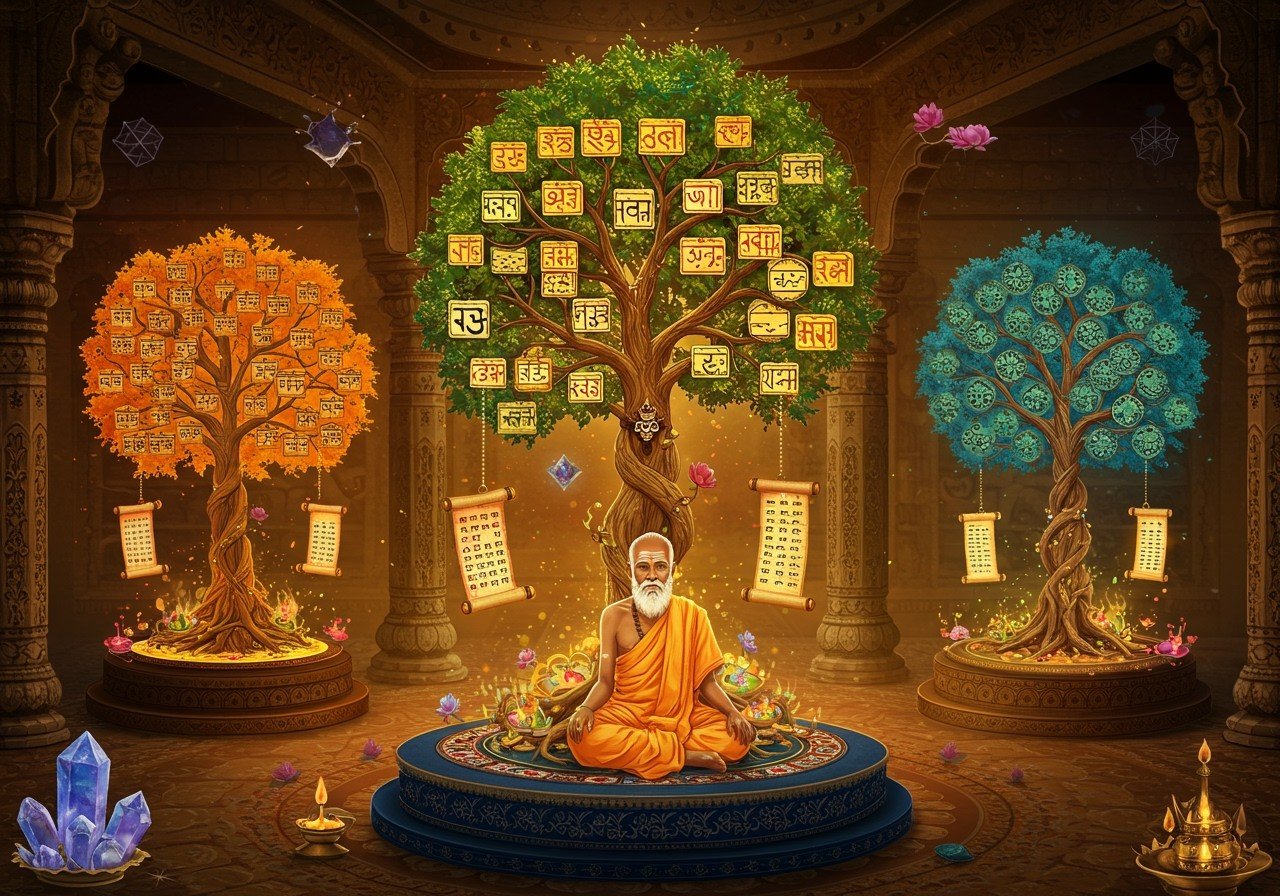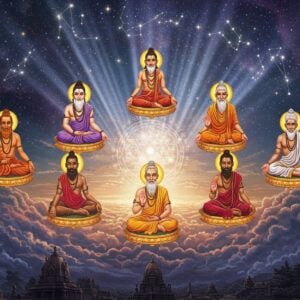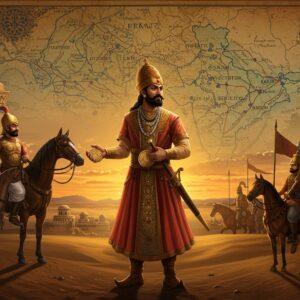
Gotra, a concept deeply woven into the fabric of Indian culture, signifies lineage and clan. It’s a word often heard during pujas, family gatherings, and discussions about heritage. This tradition isn’t limited to Hinduism; its influence extends to Jainism and Sikhism as well. Understanding Gotra helps us connect with our ancestors and provides a framework for many cultural practices, especially when it comes to marriage. For those of us who cherish tradition and authenticity, delving into the world of Gotra offers a glimpse into both personal heritage and broader social customs.
Gotra in Hinduism
The roots of Gotra lie deep within ancient Vedic scriptures, establishing its importance in Hindu traditions. It plays a vital role in deciding matrimonial alliances, following the principle of exogamy – marrying outside one’s own Gotra. This practice promotes genetic diversity within the community. During religious rituals, reciting one’s Gotra invokes blessings from ancestors, connecting us to a lineage of Rishis, the revered sages of our past. Different Hindu communities have their unique Gotra classifications, showcasing the beautiful diversity within the religion. In today’s world, the understanding of Gotra, particularly among the urban middle class, has adapted to modern influences. While some traditional practices may have evolved, the significance of Gotra in preserving ancestral identity continues to be honored.
For those seeking to deepen their understanding of Hindu rituals and traditions, exploring Hinduism’s core beliefs and practices can be incredibly enriching.
Gotra in Jainism
In Jainism, Gotra represents spiritual lineage, not just biological ancestry. While mirroring some aspects of the Hindu concept, it possesses unique characteristics. For Jains, Gotra helps define one’s spiritual path and social identity. It’s a key factor in matrimonial alliances, ensuring the continuity of spiritual and cultural values. Jain Gotra connects individuals to the Tirthankaras, the highly revered spiritual teachers. This connection inspires followers to embrace a life of virtue and righteousness. Gotra is often acknowledged during Jain rituals and ceremonies, keeping traditions vibrant within the community. Modernity has brought new perspectives. Many urban Jain families are now open to inter-Gotra marriages, reflecting evolving mindsets while still respecting their heritage. Despite these shifts, Gotra remains a fundamental aspect of Jain identity.
Gotra in Sikhism
Sikhism, as a reformist movement, challenged orthodox Hindu practices, including the Gotra system. Sikhs prioritize the equality of all, transcending caste and clan distinctions. However, cultural influences, especially traditional Punjabi clan structures, still have a presence. While Sikh teachings advocate equality, clan affiliations can still influence marital choices. Families might consider clan lineage during marriage arrangements, balancing religious teachings with cultural heritage. The core principles of Sikhism, community (Sangat) and service (Seva), take precedence over Gotra. Modern Sikh communities thoughtfully navigate these complexities, upholding traditions while embracing the principle of equality.
Learn more about the interplay of Dharma and Karma in Hinduism and how they influence our lives.
Clan Systems Across the Globe
Clan systems exist across the world, each with unique expressions of identity and community. Scottish clans are renowned for their tartan patterns and historical loyalty to their chief, celebrating their heritage globally. In Africa, clans offer vital support and security in regions where government services may be limited, playing a particularly crucial role in countries like Somalia. Similarly, clan structures hold significant sway in the Middle East and Central Asia. The Chinese ‘Jiazu’ system emphasizes family history and legacy, underscoring the importance of lineage. Native American clans, like those in the Iroquois Confederacy, often follow matrilineal descent. In India and Japan, clan influence is still present, although declining in Japan. Arab societies have sub-tribal clan groups. Each culture adapts clan structures in unique ways to govern social aspects like marriage and inheritance. Comparing these systems with India’s Gotra offers valuable insights into global traditions. You can also explore Hinduism’s global reach and diverse traditions for a wider perspective.
How Poojn.in Supports Your Gotra-Related Rituals and Practices
Poojn.in is your trusted partner for all your Gotra-related religious needs. We offer:
- Authentic Ritual Items:
We offer complete puja samagri kits tailored to different Gotras, ensuring you have everything you need for your ceremonies. Our collection includes pure copper and brass items specifically designed for Gotra-specific rituals, traditional janeu (sacred thread) for sacred thread ceremonies, and specialized items for ancestral worship based on your Gotra.
- Expert Guidance:
We offer complimentary consultations on Gotra-specific rituals, helping you understand the nuances of your traditions. We also provide verification of Gotra-related items and can connect you directly with knowledgeable pandits for ritual guidance. For quick questions, reach out to us on WhatsApp at 9476142738.
- Convenient Shopping:
We offer pan-India delivery of all Gotra-related items, secure online payment options, quality-checked authentic products, and bulk ordering for family ceremonies, making your shopping experience hassle-free.
Customized Dust Coloured Clay Pot and Customized Fabric Coloured Clay Dinner Set could be perfect for specific Gotra rituals.
Featured Products for Gotra Rituals:
- Copper Kalash Set for Gotra Puja
- Premium Sandalwood Sticks for Ancestral Offerings
- Complete Shraddha Kit
- Traditional Brass Puja Thali Set
For personalized help with Gotra-related products, please contact us:
- Phone: 03369029784
- WhatsApp: 9476142738
All our products are packaged and handled with utmost care to maintain ritual purity. Visit www.poojn.in to discover our complete collection of Gotra-specific items and services.
Conclusion: A Tapestry of Tradition
Exploring Gotra and clan systems reveals a vibrant tapestry of traditions worldwide. Each system uniquely shapes identity, social structures, and the passing down of heritage. In Jainism, Gotra links individuals to spiritual teachers, guiding their journey. Sikhism, with its emphasis on equality, thoughtfully navigates clan affiliations. Across the globe, clan systems, from Africa and Scotland to Native American communities, demonstrate the universal human need for lineage and belonging. They serve as a bridge between the past and the present, providing a sense of identity and continuity. Understanding these varied systems deepens our appreciation for cultural heritage. It reminds us that while expressions of tradition may differ, the core values of identity, community, and continuity unite us all. By respecting and preserving these traditions while embracing change, we can forge a meaningful connection with our past and build a richer future.
Frequently Asked Questions about Gotra
What is Gotra in the Hindu religion? Gotra signifies lineage or clan, assigned at birth. It connects individuals to a shared ancestor and plays a vital role in matrimonial decisions.
Why is Gotra important in Hindu marriages? Gotra helps prevent marriages within the same lineage, promoting genetic diversity. This practice has been traditionally followed to reduce the risk of hereditary health issues and ensure a wider gene pool within the community.
How is Gotra determined in Jainism? In Jainism, Gotra reflects family lineage and spiritual teachings passed down through generations. It represents one’s spiritual heritage and influences religious practices, shaping one’s spiritual journey.
Do Sikhs follow the concept of Gotra? Sikhs don’t typically adhere to Gotra as strictly as Hindus or Jains. Sikhism prioritizes equality, diminishing Gotra’s importance in religious practices. However, cultural factors may still have an influence on some families.
Can Gotra change in Hindu religion? Usually, Gotra doesn’t change, as it’s patrilineal. However, exceptions might occur during specific rituals or profound spiritual shifts.
Is Gotra relevant in modern times? Gotra continues to be relevant, especially in traditional rituals and marriages. Its significance can vary among individuals and communities.
What are the differences between Gotra in Hinduism and Jainism? Hindu Gotra focuses on ancestral lineage, while Jain Gotra emphasizes spiritual teachings and heritage. Both recognize lineage, but approach it differently.
How does Gotra influence cultural identity? Gotra shapes cultural identity by connecting individuals to their ancestral past. It influences family traditions, social interactions, and a sense of belonging within the community.
We believe that honoring one’s heritage is crucial, and we are here to provide support in any way we can. If you have any further questions or need more information, please don’t hesitate to visit our website or contact us directly.


